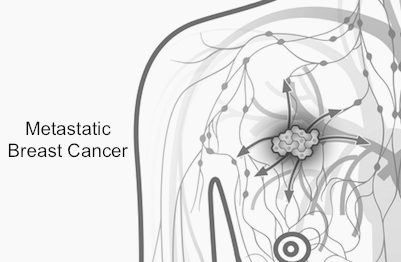What is Metastatic Breast Cancer?
Metastatic breast cancer is breast cancer that has spread to other parts of the body. It is the most advanced stage of breast cancer. Other names for metastatic breast cancer are stage IV, secondary and advanced cancer. Metastatic breast cancer occurs when cancer cells break off from the original area and move to other parts of the body through blood or lymphatic vessels. This can occur before the cancer is treated or after, if treatment did not remove all of the cancer. For many women, this is the first diagnosis of breast cancer.
Cancer can travel around the body through blood or lymphatic vessels and then settle in new areas. If this happens, the new cancer is called a metastasis or secondary. Areas most commonly affected by metastatic breast cancer are the bones, brain, liver and lungs. This does not mean, however, that these areas will be affected. In addition, the new cancer that forms is still breast cancer, no matter where it is located.
Metastatic breast cancer is often considered incurable, however, there are new treatments that may cause remission and allow for a long life.
Symptoms of Metastatic Breast Cancer
Symptoms of metastatic breast cancer vary from person to person and depend on the location of the secondary cancer. The following are a collection of symptoms that may or may not be experienced.
In the Bone
- back, bone or joint pain
- numbness or weakness in specific areas of the body
- a change in bladder or bowel activity or control
- hypercalcaemia (increased levels of calcium in the blood)
- confusion
- constipation
- dehydration
- excessive thirst
- frequent urination
- muscle weakness
- vomiting
In the Brain
- blurry, double or loss of vision
- change in personality
- confusion
- headaches
- loss of balance, frequent falls
- nausea and vomiting\
- seizures
- weakness in arms and/or legs
In the Liver
- abdomen pain on the right side of the abdomen (doesn’t go away and has no other obvious cause)
- abdomen swelling or bloating
- abnormalities in liver functioning (appear in blood tests)
- fatigue
- jaundice
- loss of appetite
- nausea
- weight loss
In the Lungs
- chest pain
- coughing that gets worse with time and doesn’t go away
- fatigue
- feeling of heaviness in the chest
- loss of appetite
- shortness of breath
- weight loss
Treatments for Metastatic Breast Cancer
There are many types of treatment for metastatic breast cancer such as hormonal therapy, chemotherapy, radiotherapy, anti-cancer treatments, surgery, pain management and alternative treatments. There is a host of professionals trained and ready to discuss all the treatments available for metastatic breast cancer. If diagnosed with metastatic breast cancer, be sure to consider all your options.
Hormonal Therapy
Hormonal therapy consists of decreasing the amount of estrogen that can get to the cancer. This kind of treatment can stop the growth of the cancer and shrink it as well. Women who have estrogen receptors in their cancer have greater results from hormonal therapy.
Chemotherapy
Chemotherapy consists of destroying rapidly reproducing cells, such as cancer cells. This kind of treatment can stop the growth of the cancer and shrink it as well. Women without estrogen receptors in their cancer may benefit more from chemotherapy than hormonal therapy.
Radiotherapy
Radiotherapy is the use of X-rays to destroy cancer cells. This kind of treatment can reduce the size of cancer and relieve pain in the body, especially bone pain.
Anti-Cancer Treatments
Trastuzumab, also known as Herceptin®, is a special antibody that attacks cancer cells with an excess of HER2/neu. This metastatic breast cancer treatment can be used alone or with chemotherapy. One study showed this anti-cancer treatment improves quality and length of life for people with metastatic breast cancer.
Alternative and Complementary Treatments
Alternative treatments are alternatives to conventional treatment for metastatic breast cancer. Some alternative treatments are Chinese herbs, homeopathy, immune therapy, megavitamins and naturopathy.
Complementary treatments are not part of, but harmonize with, the conventional treatments for metastatic breast cancer. Some examples of complementary treatments are acupuncture, art, dietary therapies, spiritual healing, laughter, massage, meditation, music, positive imagery, relaxation, support groups, tai chi and yoga.
Be sure to inform your doctor before beginning any alternative or complimentary treatments as some may have an adverse affect when used in conjunction with conventional therapy.

No Comments